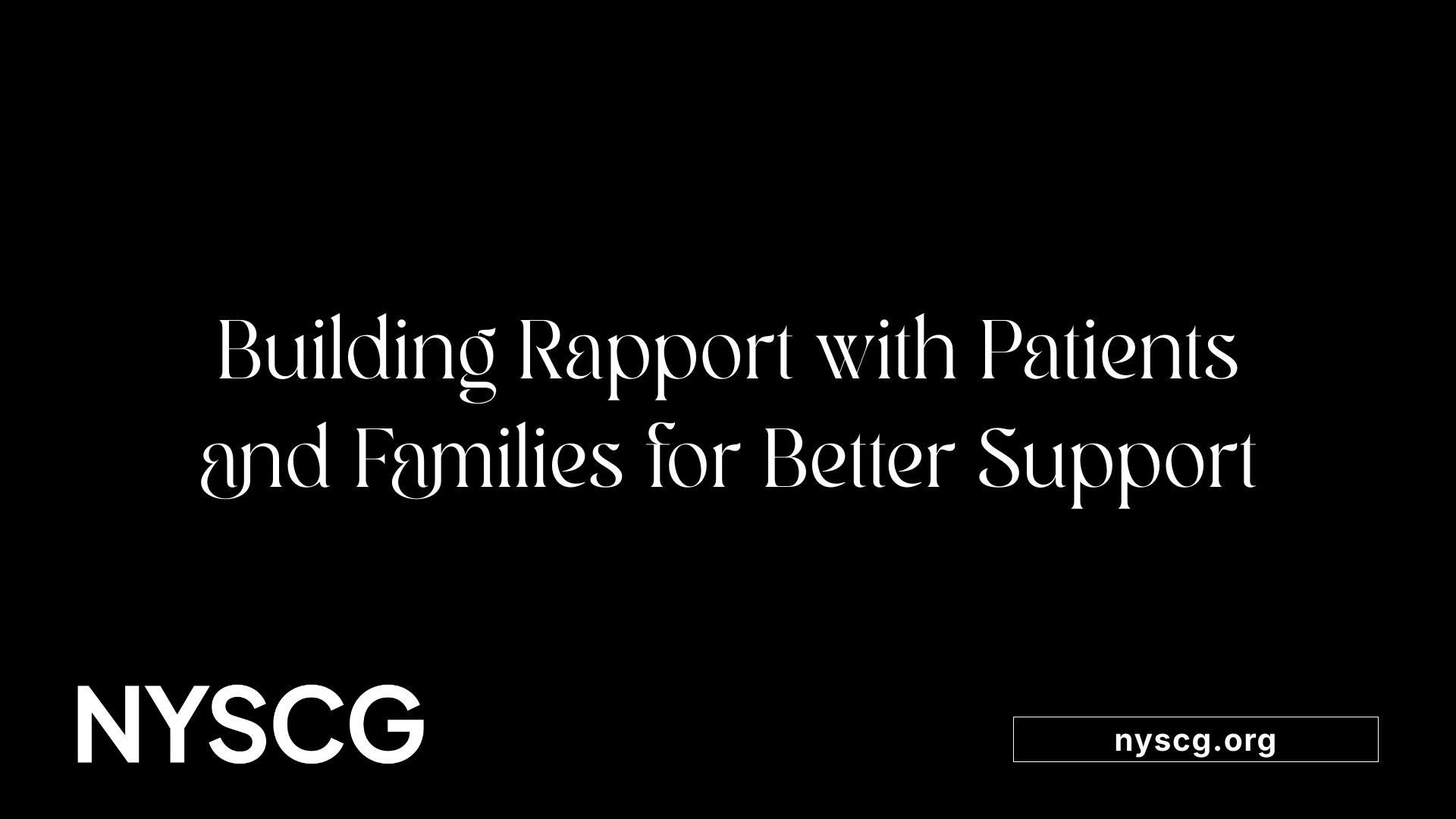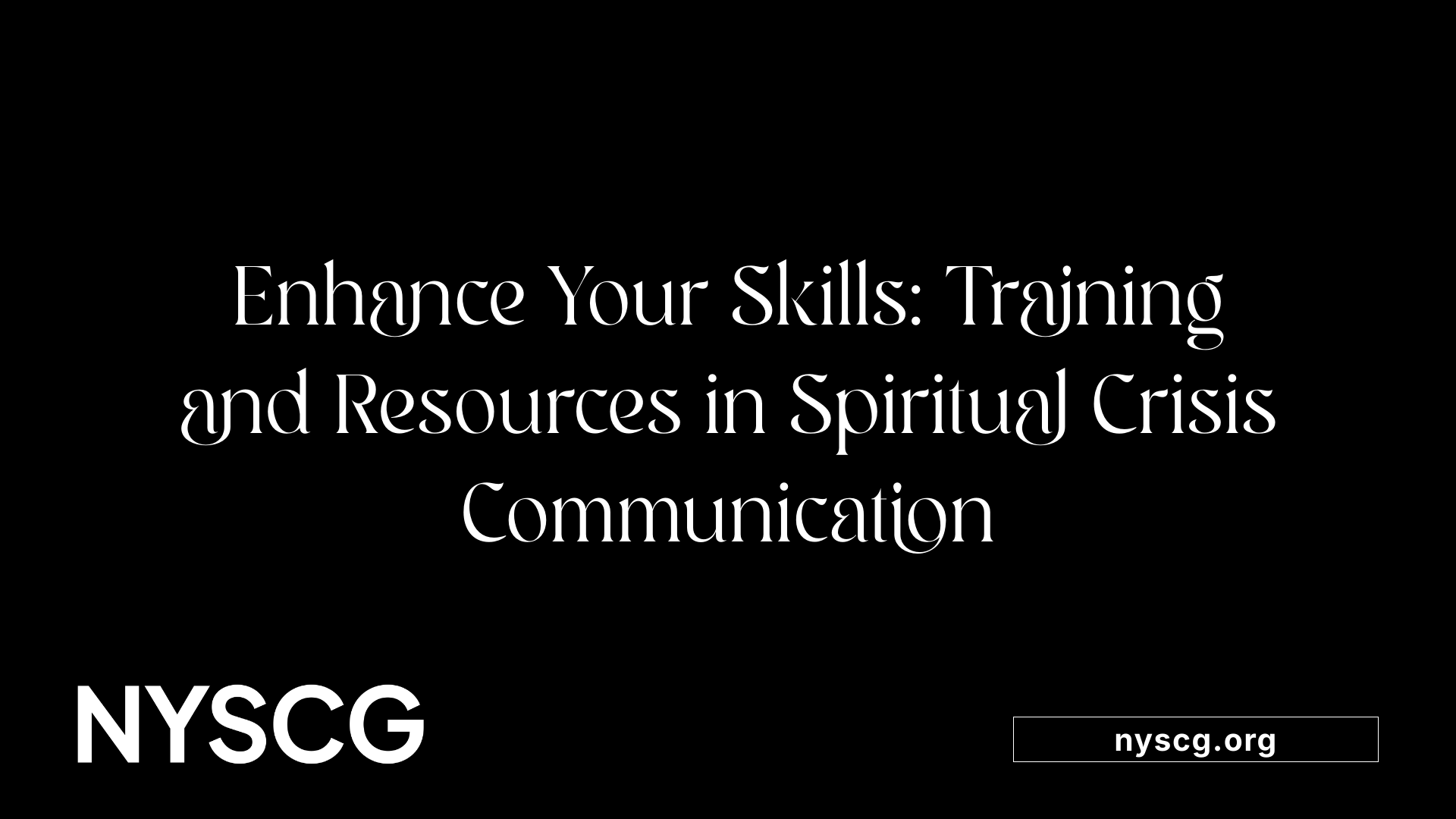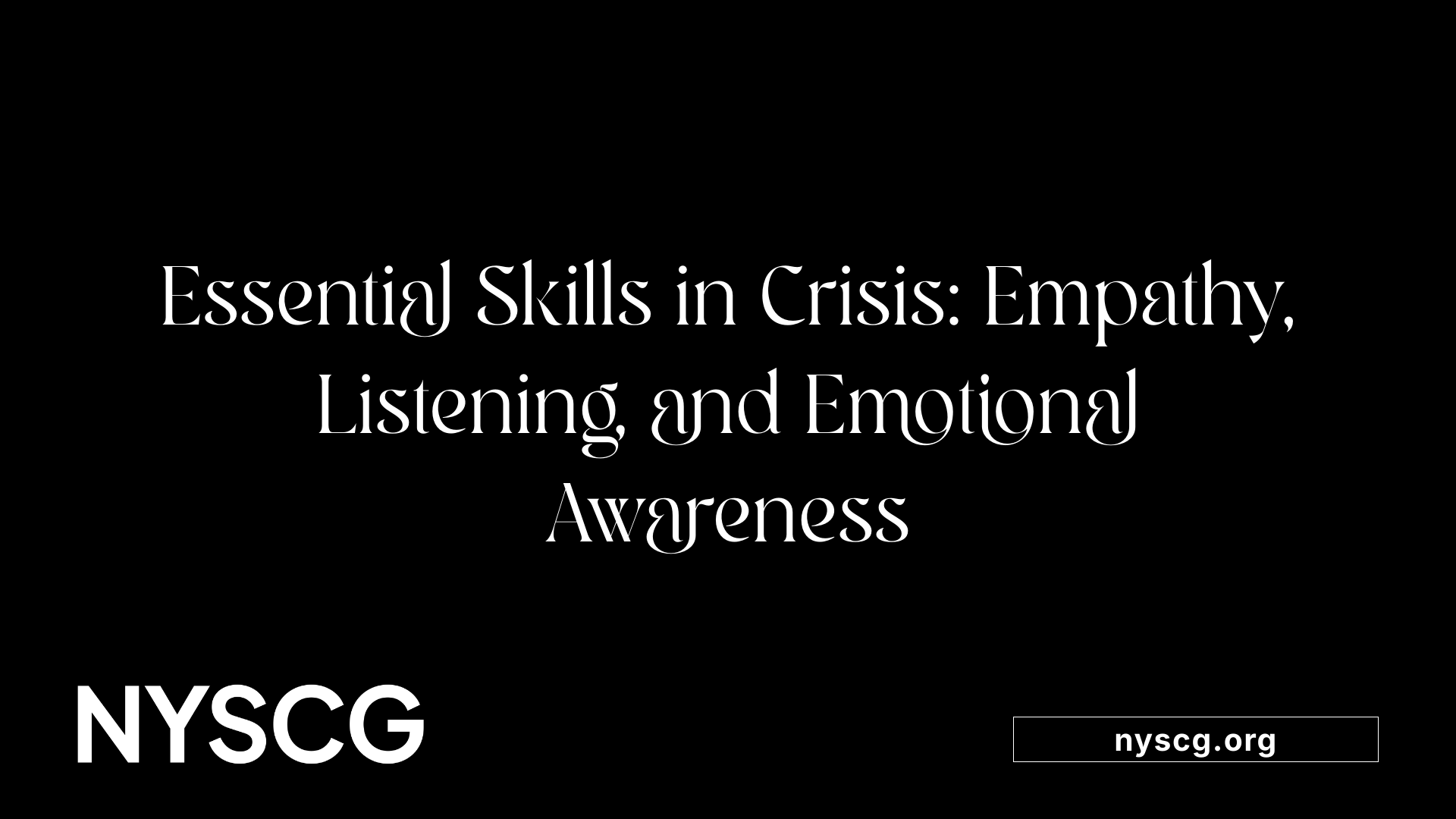Crisis Communication Skills Every Spiritual Care Provider Should Have


Effective spiritual care demands specialized communication skills tailored to the unique emotional and spiritual needs of individuals during crises. These skills enable providers to foster trust, facilitate meaningful conversations, and offer holistic support amidst chaos and uncertainty.

Creating a trusting environment is fundamental for effective spiritual care during crises. Patients and families often face distressing situations, and their willingness to share deeply personal beliefs or concerns depends on feeling safe and respected. Trust is built through consistent, compassionate, and non-judgmental communication, emphasizing confidentiality and respect for individual spiritual practices.
Offering a safe space involves engaging in clear, empathetic conversations that acknowledge the individual's feelings and experiences. Techniques such as active listening, open-ended questions, and reframing difficult topics foster openness. It is vital for caregivers to acknowledge the reality of the patient’s circumstances while gently guiding the discussion towards spiritual needs and support resources.
Establishing rapport helps to develop a connection that encourages honest dialogue about spiritual concerns. Caregivers can build rapport by demonstrating genuine interest, displaying cultural sensitivity, and being present in the moment. By doing so, they not only gather necessary information but also contribute to emotional and spiritual reassurance.
Effective providers utilize active listening, empathy, and emotional intelligence. They communicate with clarity and compassion, respecting cultural diversity. Skills include assessing spiritual distress, facilitating valuable conversations about personal beliefs, and collaborating with healthcare teams. Maintaining confidentiality, practicing ethical communication, and staying adaptable with evolving methods like digital communication are essential.
The ICC curriculum employs role-play, case studies, mindfulness, and spiritual assessment tools like FICA to strengthen these skills. Post-training, participants report improved capabilities, leading to better spiritual support in practice. Additional resources such as the National VOAD Disaster Spiritual Care Guidelines and educational videos assist professionals in staying current. The virtual training programs from ICISF provide specialized instruction for disaster responders, emphasizing the integration of emotional and spiritual care in crisis response.
| Focus Area | Techniques | Resources |
|---|---|---|
| Trust building | Empathy, confidentiality, active listening | ICC training modules, spiritual assessment tools |
| Safe dialogue | Reframing, acknowledgment, open-ended questions | Disaster spiritual care guidelines |
| Rapport creation | Cultural sensitivity, presence, compassion | ICISF courses, educational videos |
Focusing on these aspects ensures that spiritual care providers can communicate effectively during crises, fostering healing and resilience in patients and families.

To strengthen communication skills in spiritual crisis situations, a variety of specialized training programs and resources are available. These include workshops, online courses, simulation exercises, and ongoing supervision aimed at enhancing the ability to engage effectively with patients, families, and disaster-affected populations.
One prominent example is the International Critical Incident Stress Foundation (ICISF), which offers courses on Emotional and Spiritual Care (ESC) in disaster settings. These courses cover essential themes such as assessing spiritual distress, understanding disaster impacts, and employing appropriate intervention strategies.
Participants learn to use tools like the FICA spiritual assessment model, which guides conversations about faith, importance, community, and address. Such tools facilitate thoughtful assessment and conversation, helping providers create safe spaces for patients and families.
Simulation exercises, including role-plays, allow practitioners to practice and refine their communication techniques in realistic scenarios. These exercises focus on active listening, reframing difficult questions, and acknowledging patient realities, skills crucial for fostering trust and emotional safety.
Online courses also offer flexible learning opportunities, often providing continuing education credits (CEUs). For example, the course from the University of Maryland, Baltimore County (UMBC), offers 1.4 CEUs, enabling professionals to maintain licensure and expand their competence in spiritual crisis care.
The overall goal of these resources is to improve responses in moments of acute distress, ensuring that spiritual needs are identified and addressed compassionately. This comprehensive approach equips clinicians, chaplains, crisis responders, and mental health professionals with effective communication tools vital during emergencies and routine spiritual care exchanges.
| Training Aspect | Description | Additional Benefits |
|---|---|---|
| Workshops and courses | Focused on spiritual and psychological first aid | Practical skills, certification, CEUs |
| Simulation exercises | Role-playing scenarios | Builds confidence and real-world readiness |
| Assessment tools like FICA | Guides spiritual conversations | Ensures thorough and respectful assessments |
| Online modules | Flexible learning | Accessible continuing education |
Searching for 'Training programs for spiritual crisis communication and disaster response' will yield numerous options tailored to various professional backgrounds, emphasizing evidence-based practices and compassionate care in crises.
Crisis communication skills are vital in healthcare, palliative care, and disaster response because they establish the foundation for trust, clarity, and empathy. Being able to assess and discuss spiritual needs thoughtfully through effective dialogue helps patients and families feel heard and supported during difficult times.
Clinicians must create a safe environment that encourages open conversations about spiritual distress and support systems. This involves using communication principles such as reframing difficult questions and acknowledging reality, which helps patients articulate their concerns without feeling judged.
In disaster scenarios, the importance of precise and compassionate communication becomes even more critical. Responders need to understand the emotional and spiritual impacts of crises on individuals and communities. Courses like the Virtual Training offered by ICISF focus on building these skills, emphasizing active listening, role-play, and case reviews to prepare responders for sensitive interactions.
Effective communication also involves referring individuals to appropriate resources, such as chaplains or spiritual care providers, thus ensuring comprehensive support. Using open-ended questions allows responders to explore deeper concerns, helping to craft personalized interventions that meet diverse needs.
Furthermore, evaluations of training programs reveal that communication about spiritual and existential issues often requires enhancement. Post-course feedback demonstrates that participants find targeted modules highly useful, leading to quality improvement efforts that better integrate spiritual care into practice.
In settings from health clinics to disaster zones, strong communication fosters coordinated responses, addresses disparities by accommodating cultural differences, and promotes mental health by reducing misunderstandings and misinformation. Ultimately, these skills are essential for delivering compassionate, effective care that respects individuals' spiritual and emotional well-being.

In crisis situations, effective communication is crucial for providing holistic spiritual care. Core skills such as empathy, active listening, and emotional intelligence form the foundation of compassionate and effective interactions with patients and families.
Empathy allows clinicians to genuinely understand and share the feelings of others, fostering trust and a safe space for meaningful conversations. Active listening involves fully concentrating on what the patient or family member is saying, without interruption, and reflecting back understanding to validate their experiences.
Emotional intelligence helps clinicians recognize and manage their own emotions while responding appropriately to the emotions of others. This fosters a supportive environment and enhances the ability to handle sensitive topics around spiritual distress delicately.
However, these competencies work best when combined with additional skills such as clear communication, decisiveness, adaptability, and situational awareness. Effective leaders in crisis must quickly assess the broader context, adapt strategies as circumstances evolve, and communicate transparently with all involved.
Strong relationship management, including stakeholder engagement and team coordination, ensures a cohesive response. Such comprehensive skill sets help reduce uncertainty, maintain morale, and support recovery efforts, ultimately providing more effective spiritual and emotional care during emergencies.
| Competency | Role in Crisis | Additional Skills Needed |
|---|---|---|
| Empathy | Builds trust, creates safe space | Communication, patience |
| Active Listening | Ensures understanding of needs | Reflection, validation |
| Emotional Intelligence | Manages personal and patient emotions | Decisiveness, situational awareness |
| Overall | Facilitates compassionate, timely response | Adaptability, leadership |
These competencies and skills enable responders to navigate complex, high-pressure environments effectively, ensuring that spiritual care remains compassionate, appropriate, and supportive.
During crises, effective communication is vital to support individuals' spiritual needs and foster trust. Clinicians should practice compassionate, active listening to truly understand each person's spiritual beliefs, emotional responses, and hopes for healing. This involves being present, attentive, and non-judgmental.
To provide meaningful support, integrating faith-based elements like prayer, Scripture, and faith dialogue can be comforting for those with religious beliefs. Asking open-ended questions allows individuals to express their spiritual concerns freely, and reframing difficult questions helps in maintaining a respectful and hope-sensitive conversation.
Using frameworks like the AMEN Protocol — which guides clinicians to Ask about spiritual needs, Meet those needs, and Name their importance — offers a structured approach to navigating complex conversations. Collaborating with spiritual care professionals such as chaplains ensures that communication remains respectful and aligned with the person's faith traditions.
In addition to direct spiritual conversation, offering practical emotional support and fostering the involvement of family and community reinforce resilience. Emphasizing hope, whether for healing or miracles, helps nurture a sense of connectedness and holistic care during challenging times.
Inserting faith-based elements such as Scripture reading, prayer, or faith-sharing can provide comfort and a sense of familiarity to patients and families during distress. These practices validate their spiritual worldview and help them find meaning amid chaos.
Frameworks like the AMEN Protocol and tools like the FICA (Faith, Importance, Community, Address) assessment enable clinicians to approach spiritual conversations systematically. They promote respectful inquiry, help identify spiritual resources, and facilitate appropriate referrals to chaplains or faith leaders.
| Strategy | Description | Benefit |
|---|---|---|
| Active listening | Fully concentrating on the speaker | Builds trust and understanding |
| Reframing questions | Softening difficult questions | Maintains respect and openness |
| AMEN Protocol | Asking, Meeting, Naming spiritual needs | Ensures comprehensive spiritual assessment |
| Collaboration with chaplains | Partnering with spiritual care providers | Provides expert support and resource |
Effectively addressing spiritual and emotional needs during crises requires a sensitive and comprehensive approach. Clinicians and responders should first establish trust by practicing compassionate listening and respectful engagement, creating a safe environment for open communication.
Recognizing individual spiritual distress and beliefs is crucial. This involves conducting spiritual assessments using tools such as the FICA method—which explores Faith, Importance, Community, and Addressing spiritual needs—and tailoring interventions accordingly.
Personalized spiritual interventions can include diverse activities like prayer, meditation, scripture reading, or engaging with nature or art. These interventions help individuals find meaning, hope, and a sense of inner peace amid chaos.
Supporting emotional well-being involves encouraging connections with trusted persons, promoting reflection, and providing reassurance—all while respecting cultural and religious preferences. Reflection and mindfulness practices are also integral, fostering resilience and mental clarity.
Referral to community resources such as chaplains, spiritual leaders, or religious communities can supplement care and offer continued support beyond immediate crisis interventions. It is important that all care remains holistic, patient-centered, and aligned with each individual's values and beliefs.
By continuously assessing and responding to these needs, responders can help individuals and families navigate their experiences with dignity, hope, and resilience, even in the most challenging situations.
Disaster response involves specialized skills focused on addressing the spiritual well-being of affected individuals. These include culturally sensitive communication, active listening, and maintaining a non-judgmental presence. Such skills help build trust and provide reassurance amid chaos.
Responders must understand and respect diverse religious and cultural traditions. This might involve knowledge of specific prayer, rituals, or worship practices that individuals identify with. Upholding ethical standards and respecting personal beliefs are fundamental in delivering respectful support.
Training in spiritual first aid and crisis intervention prepares responders to recognize spiritual needs. These skills enable them to facilitate hope, offer comfort, and prevent further harm, ensuring care aligns with the person’s faith practices.
Working hand in hand with local faith communities and organizations strengthens disaster spiritual care efforts. Utilizing existing resources and community networks ensures a more effective, culturally appropriate response.
It is also crucial for responders to understand their role boundaries, protect confidentiality, and avoid exploiting vulnerable individuals. This holistic approach helps foster resilience and aids in healing throughout all stages of disaster management.
For further insights on effective practices, search for "Spiritual crisis intervention in disaster settings." This resource offers comprehensive guidance on supporting individuals during their most vulnerable moments in crises.
During crises, clinicians and spiritual caregivers must adhere to fundamental principles that ensure ethical and respectful communication. Respecting individual autonomy involves honoring each patient's spiritual beliefs and preferences, allowing them to participate actively in their spiritual care plan. Maintaining confidentiality is crucial, especially given the sensitive nature of spiritual and psychological distress, which fosters trust between caregivers and those they serve.
Practicing cultural sensitivity ensures that interventions are appropriate and inclusive of diverse backgrounds. Using validated spiritual assessment tools like FICA guides practitioners in evaluating spiritual needs ethically and effectively, allowing for tailored care that respects individual differences.
Adapting protocols to fit various settings—whether in hospitals, disaster zones, or community environments—is essential for relevance and effectiveness. It involves being flexible with intervention strategies while maintaining core ethical standards.
Care providers should always be mindful of their role boundaries, avoiding overreach or exploitation of vulnerable individuals. Collaboration with community resources and spiritual leaders helps extend care beyond immediate clinical interactions, offering comprehensive support.
Transparency and honesty in all communications not only respect the dignity of the individual but also promote trust. Compassionate delivery of information and reassurance can significantly reduce distress and foster a safe environment for spiritual and emotional healing.
In summary, these principles cultivate an environment where ethical, inclusive, and respectful spiritual care can be delivered effectively during crises, ensuring that care is patient-centered and culturally appropriate.
In crisis situations, the ability to communicate effectively about spiritual concerns is essential for providing meaningful support. Key skills include active listening, asking open-ended questions, and reframing difficult topics to create an open, safe space for patients and families to express their spiritual distress and needs.
Training programs like the ICC curriculum utilize role-play, case studies, mindfulness reflection, and assessment tools such as FICA to develop these communication skills. Post-course evaluations have shown that participants recognize the importance of spiritual care and actively focus on improving their practice.
Ongoing education and reflection are crucial for maintaining high standards. Disaster response training like ICISF’s Virtual ESC course further enhances skills, enabling responders, chaplains, and mental health professionals to address the multifaceted impact of disasters on spiritual well-being. Such courses emphasize understanding personal faith traditions, integrating crisis intervention principles, and caring for oneself during deployment.
Building trust through competent communication nurtures resilience in crisis settings. It helps patients and families feel heard, valued, and supported during their most vulnerable moments. Developing these skills strengthens the capacity of spiritual care providers to foster healing, hope, and recovery even amidst adversity.
| Skills and Strategies | Importance | Resources & Training Tools |
|---|---|---|
| Active Listening | Builds trust and understanding | FICA spiritual assessment tool, role-play |
| Open-ended Questions | Gathers in-depth information about needs | Case studies, mindfulness reflections |
| Reframing Difficult Questions | Creates a supportive conversation environment | ICC curriculum, disaster care models |
| Acknowledging Reality | Validates patient experiences | Educational videos, national guidelines |
| Referring to Chaplains and Resources | Provides specialized spiritual support | UHMC CEU options, disaster spiritual care guidelines |
By continuously developing communication abilities and applying learned strategies, spiritual care providers can significantly enhance their effectiveness, offering compassion and support in moments of profound crisis.
Mastering crisis communication skills is indispensable for spiritual care providers working in complex emergency contexts. These skills not only improve immediate responses but also foster long-term resilience and spiritual well-being. Ongoing training, ethical practice, and culturally sensitive engagement form the foundation of effective spiritual crisis intervention, ultimately ensuring that individuals facing adversity receive compassionate, competent, and dignified support.
All you need is the will to make the world a better place.
New York State chaplain group inc. is a tax deductible organization with a federal tax Id number 92-383-4921